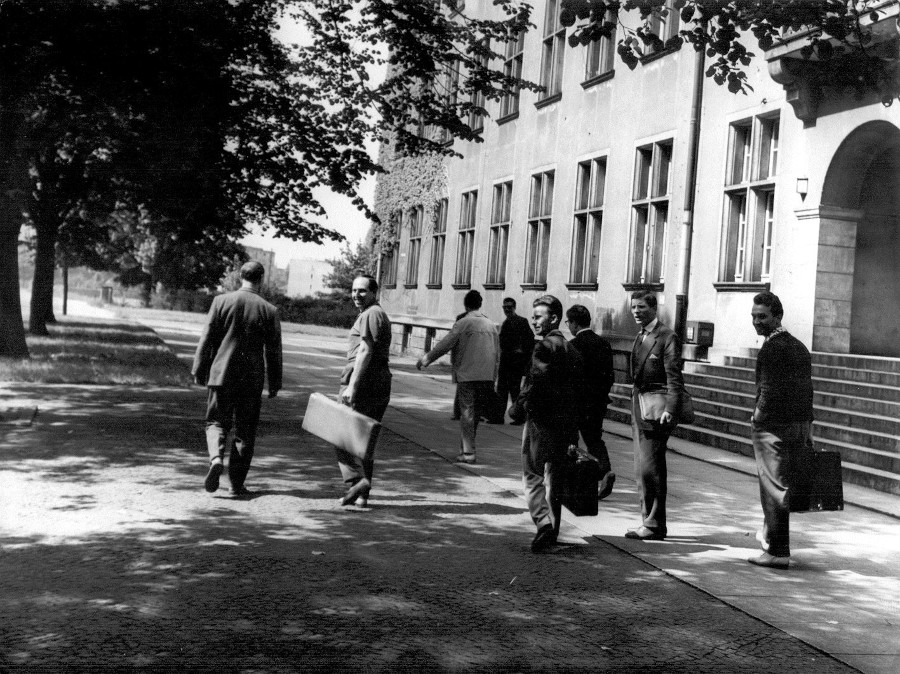Already in December 1945, a factory repairing musical instruments was opened in Wrocław, so you might think that there were many music lovers among the new inhabitants.
Although they preferred to watch the performances of revue theatres, the Wrocław Philharmonic did not give up. Even though the orchestra was shrinking, they were still playing. They performed not only symphonic concerts, but also served as an opera orchestra. The performances were pioneering in spirit, realized across national and political divisions. Halka, or “the tragedy of the people enchanted in the immortal melodies of Moniuszko,” which Wroclaw citizens watched for the first time on 8 September 1945, was produced by a Polish-German ensemble with the support of the Red Army.
German dancers learned polonaise, mazurka and highlander dances, the choir (Polish) was borrowed from the Bytom Opera House for three performances, the Russians took care of the advertising by dropping leaflets from the kukuruzhnik, and the Philharmonic played in a Polish-German line-up. The harmony was almost perfect. And even very much so, at least according to the great violinist Eugenia Umińska, who performed on 27 August 1945. The artist had in her programme, among others works by Nowowiejski, Karłowicz, Chopin and Wieniawski, accompanied by the pianist Jan Hoffmann and the orchestra, or in fact – as Umińska severely judged – “something like a high school orchestra, its incompleteness of a sound blowing the ear accustomed to normal symphony orchestras”. Perhaps the criticism of the artist was corroborated by the low attendance at her recital – only one-hundred and twenty people came. And even if she was right, you must remember that the Wrocław Philharmonic was just an orchestra in the making.
Unfortunately, the making progressed very slowly, as it turned out in November that the number of musicians was diminishing. Out of eighty, only thirty – twenty Germans and ten Poles remained. Stefan Syryłło, however, did not throw out the baton, and even received support. In the 1946/1947 season, Stanisław Skrowaczewski became associate conductor. Today, he is a respected composer and one of the greatest conductors – world class – when he stands in front of an orchestra, they play like never before. But he was just starting his career in Wrocław.
Hailing from Lviv (born in 1923, he was a student of the famous Kazimierz Wielki Grammar School, from which the poet Zbigniew Herbert graduated, among others) and a Lwowiak at heart, he left the city during forced evictions as an adult. It was in Lviv that the four-year-old Staś sat in front of the piano keyboard, composed his first symphonic piece when he was only seven, and at the age of thirteen made his debut as a conductor. He graduated from the Lviv Conservatory and the State Superior School of Music in Kraków, unfortunately World War II and an injury to both hands destroyed his piano career – so he decided to devote himself to composing and conducting.
The fact that he came to Wrocław fits perfectly into the myth about the Lviv origin of its Polish inhabitants. In fact, those displaced from the former voivodeships of eastern Poland constituted only 20.5 percent, but the representation of the Lviv region was actually the strongest – 9.8 percent. However, the Zabużanie [former inhabitants of Poland’s eastern territories lost to the Soviet Union after WWII – translator’s note] were particularly visible in the city. They cultivated their regional differences, although the authorities considered it a political provocation. Giving the pubs the names “Lwowianka” or “Ta-joj” was considered reprehensible, and the premises themselves were treated as places of anti-state agitation.
Yet Skrowaczewski abandoned Wrocław for Katowice and the Silesian Philharmonic, and then for Kraków – which at that time did not surprise anyone. The city was in ruins and its fate uncertain. However, the orchestra continued to play, although Andrzej Johelson, co-founder of the Lower Silesian Music Lovers Society, was pessimistic that no more than a hundred inhabitants of Wrocław were interested in classical music. The new director, Kazimierz Wiłkomirski (he started his mission impossible at the beginning of the 1947/1948 season), brought in outstanding soloists and leading conductors. The inhabitants of Wrocław had the opportunity to applaud the pianists: Zbigniew Drzewiecki, Stanisław Szpinalski, Bolesław Woytowicz, Władysław Kędra, and Ryszard Bakst. Conducting were Zdzisław Górzyński, Stanisław Wisłocki, and Andrzej Panufnik.
However, when the Wrocław Opera was nationalized on 1 September 1949, the orchestra “got stuck in the pit” for good and for the five years to follow there were no regular symphonic concerts in Wrocław.
Beata Maciejewska

